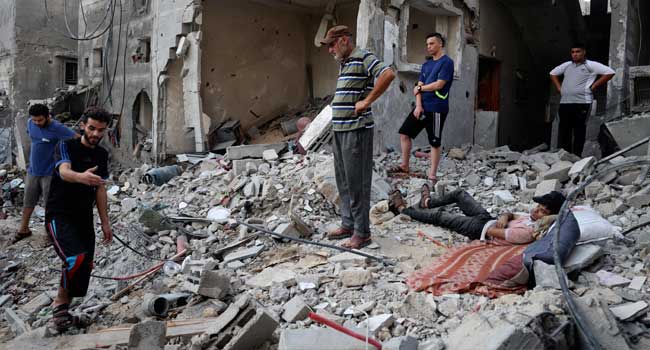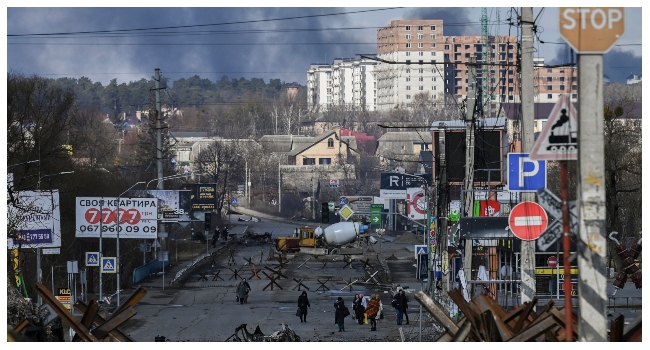
Israeli ground troops encircled Gaza City on Friday in their war against Hamas, as top US diplomat Antony Blinken arrived in Israel for a trip focused on “concrete steps” to minimise Palestinian civilian casualties.
Ahead of Blinken’s arrival, Israel’s military said on Thursday it had “completed the encirclement” of the narrow Palestinian territory’s largest city — signalling a new phase in the nearly month-long conflict.
Fighting was triggered by Hamas’ bloody raids on October 7 that Israeli officials say killed more than 1,400 people.
The Hamas-run Gaza health ministry says more than 9,000 people have died in Israeli bombardments, mostly women and children.
READ ALSO: Gaza Health Ministry Says 27 Killed In Israel Strike Near UN School
Fresh Israeli strikes rocked the Gaza Strip on Friday morning, an AFP correspondent said, and the Gaza health ministry reported at least 15 deaths in Gaza City’s Zeitun neighbourhood and seven in Jabalia refugee camp.
The Hamas government has said 195 people were killed in Israeli bombardments on Jabalia earlier this week, with hundreds more missing and wounded, figures AFP could not independently verify.
Before his departure, Blinken said he would seek to ensure that harm to Palestinian civilians is reduced, in a visible shift of tone for the United States which has promised full support and ramped-up military aid to Israel.
“We will be talking about concrete steps that can and should be taken to minimise harm to men, women and children in Gaza,” Blinken said.
“This is something that the United States is committed to.”
Prime Minister Benjamin Netanyahu said Israel had already had some “very impressive successes” with troops “more than on the outskirts of Gaza City. We are advancing,” he said late Thursday at a base near Tel Aviv.
Israel’s military describes Gaza City as “the centre of the Hamas terror organisation”.
Although many of the city’s half-a-million residents fled south following Israel’s warning to leave the north ahead of a ground operation, those who stayed behind have endured weeks of withering aerial bombardments, dwindling supplies and daily carnage.
Outside Gaza City’s Al-Quds hospital, displaced residents seeking shelter from Israeli strikes told AFP on Thursday that civilians would not withstand the barrage much longer.
“This is not a life. We need a safe place for our kids,” said 50-year-old Hiyam Shamlakh. “Everybody is terrified, children, women and the elderly.”
But yet more carnage seems to lie ahead, as the conflict turns to urban and underground warfare — with Hamas fighting from a tunnel complex believed to span hundreds of kilometres (miles).
The Ezzedine Al-Qassam Brigades, the military wing of Hamas, insisted Israeli soldiers would go home “in black bags”.
“Gaza will be the curse of history for Israel,” spokesman Abu Obeida said.
Israel’s allies have backed its right to self-defence, but there is growing global concern and anger at how Israel has chosen to prosecute the war.
A group of UN-mandated human rights experts warned Thursday that “time is running out to prevent genocide and humanitarian catastrophe in Gaza”.
“We remain convinced that the Palestinian people are at grave risk of genocide,” the experts, who do not speak for the United Nations, said in a joint statement.
They called for “a humanitarian ceasefire” and the immediate release of all civilians being held captive since the Hamas attack.
“The situation in Gaza has reached a catastrophic tipping point,” the experts said, warning of the “dire need” for food, water, medicine, fuel and essential supplies and the risk of looming health hazards.
Israel’s Geneva embassy denounced the report as Hamas “propaganda” in a post on X, formerly Twitter.
Both Israel and the United States have ruled out a blanket ceasefire, which they say would allow Hamas to regroup and resupply.
US President Joe Biden has backed “temporary, localised” pauses in fighting to allow humanitarian work to be done.
Countries around the world recalled their ambassadors from Israel in protest at the strikes. Bolivia severed diplomatic ties.
Israel has sought to show Jabalia was a legitimate target, saying it killed a senior Hamas commander in a tunnel complex below the camp.
On Thursday some 400 more foreigners and dual nationals managed to escape the war to Egypt, along with 60 wounded Palestinians.
Egypt has said it would help evacuate 7,000 foreigners through Rafah, which was to open again on Friday, a source at the crossing told AFP.
The UN said more than 100 trucks with aid crossed into Gaza on Thursday, a significant increase from previous days.
A total of 374 trucks have entered since a US-brokered deal was enacted on October 21, far short of what aid agencies say is needed.
Meanwhile, in Israel’s north, Lebanon’s Hezbollah said it attacked 19 Israeli positions along the border simultaneously.
Some 71 people have been killed in Lebanon since the Israel-Hamas war began, according to an AFP tally. On the Israeli side, nine people have died.
Hezbollah chief Hassan Nasrallah is on Friday expected to break weeks of silence and deliver a speech that could have a profound impact on the region.
Some analysts believe Hezbollah has little interest in becoming fully embroiled in a conflict that Israeli officials have threatened could destroy Lebanon.
Others say the decision lies with Iran, which leads the regional “axis of resistance” against Israel — backing Hamas, Hezbollah and a rollcall of armed groups from Syria, Iraq and Yemen.


